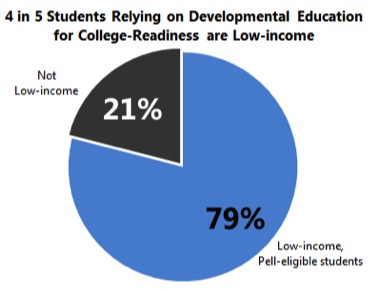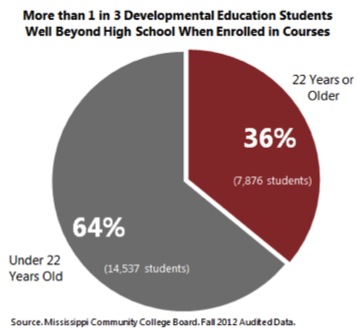DEFUNDING REMEDIATION COULD LIMIT ACCESS TO COLLEGE AND ECONOMIC OPPORTUNITY FOR THOUSANDS
February 5th, 2013
Last week MEPC’s blog featured background on the needs of Mississippi’s underprepared college students that enroll in development education as they pursue their goal of a college degree. In Mississippi, 79% of community college students in developmental education are from economically disadvantaged backgrounds, and 36% are working-age adults 22 years old or above. These students rely on accessing community colleges through developmental education in order to have opportunities for greater economic prosperity and job stability.
This session, several pieces of legislation focus on developmental education at Mississippi colleges.
Unfortunately, legislation purposed this year could have harmful effects on thousands of Mississippi’s low-skill college students. SB2056, which passed out of the Senate Universities and Colleges committee, would mandate that state leaders come up with a plan to remove funding for developmental education programs on community colleges and university campuses. The bill would require state leaders to report a plan for pulling state resources allocated to colleges and universities for all remedial classes by November of 2013.
DEFUNDING REMEDIATION COULD LIMIT ACCESS TO COLLEGE AND ECONOMIC OPPORTUNITY FOR THOUSANDS
Removing state funding for remedial education would be detrimental to over 7,800 adult students on post-secondary campuses that depend on these courses to refresh skills and pursue a college degree (see chart).
When asked how universities and colleges could still provide these essential courses to underprepared students without state funding,several state leaders claim students could cover the costs themselves. These claims are problematic because they fail to consider two critical factors. The first is that students already cover some of the cost of their developmental education coursework through tuition. The second is that close to 80% of Mississippi’s college students in remediation lack additional resources and rely on Pell grants to cover the cost of their education expenses. Charging these students more for classes that are absolutely critical to their success is impractical and stands to block the path to greater economic opportunity and educational attainment for some of Mississippi’s most disadvantaged students.
A college degree is increasingly essential for financial security. With only a high school degree, working Mississippians earn $24,067 per year, well below what is needed to support a family or reach economic security. Community colleges and their remedial courses are instrumental in ensuring Mississippi’s workforce can start the path to the college degrees they need for economic opportunity.
SHIFTING THE FOCUS TO IMPROVING DEVELOPMENTAL EDUCATION
It remains true that too many Mississippi students enter college each year without the preparation they need to succeed in college courses. However, proposals that call for undercutting essential funding for developmental education, threaten paths to greater economic opporunity for thousands of Mississippi residents, especially working adults.
Instead, attention needs to focus on increasing the college success rate of those students that begin their college careers in developmental education. A previous blog focuses on 4 priorities for stregthening community college developmental education programs. Many of these priorities require planning, research and additional resources for colleges to meet the needs of a diverse population of underprepared students.
Without adequate suppose of developmental education, 22,000 students will lack a clear path to preparing for college coursework each year. Mississippi’s workforce, families and businesses all stand to benefit from reforms that make developmental education programs stronger, rather than weakening the courses by pulling funding.
Author: Sarah Welker, Policy Analyst






